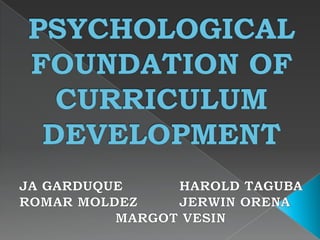
Psychological foundation of curriculum
- 3. The scientific study of mental functions and behavior including: Perception Cognition Behavior Emotion Personality Interpersonal relationships
- 4. Basis of understanding – John Dewey Modes of thinking – Jerome Bruner “Unifying elements of the learning process. It forms the basis for the methods, materials, and activity of learning… serves… for many curriculum decision How we think and how we learn
- 7. Focuses on stimulus response and reinforces; Studies conditioning, modifying, or shaping behavior through reinforcement and rewards
- 8. THORNDIKE – Connectionism PAVLOV (AND WATSON) – Classical Conditioning SKINNER – Operant Conditioning BANDURA – Observable Learning and Modeling GAGNÉ – Hierarchical Learning
- 9. Father of modern educational psychology & founder of behavioral psychology CONNECTIONISM Laws of Learning › Law of Readiness › Law of Exercise › Law of Effect
- 10. Thorndike’s Influence Thorndike and other followers believed that rote memorization does not necessarily strengthen connections Thorndike broke the traditional thinking about hierarchy of subject matter
- 11. Pavlov was the first to demonstrate Classical Conditioning. He is best known for his experiment with salivating dogs. CLASSICAL CONDITIONING Pavlov’s experiment with salivating dogs best demonstrated the principle of Classical Conditioning.
- 12. Watson took Pavlov’s findings to another level. Emphasized that learning was observable or measurable, not cognitive. Believed the key to learning was in conditioning a child from an early age based on Pavlov’s methods. Nurture vs. Nature
- 13. One of the most influential American psychologists He began his research with rats at Harvard and pigeons during WWII. Respondent vs. Operant behavior Operant Conditioning
- 14. Types of reinforcers Operant behavior will “extinguish” without reinforcement By selecting which behavior to reinforce, we can direct the learning process in the classroom Learners can acquire new operants “Education is what survives when what has been learned has been forgotten”
- 15. Contributed to the understanding of learning through observation and modeling
- 16. Gagné’s Hierarchy of Learning notes the transition from behaviorism to cognitive psychology Mental operations needed for each outcome differ Gagne’s Instructional Events lead into cognitive Psychology Five Learning Outcomes (observable and measurable) The Hierarchy of Learning
- 18. Curriculum should be organized so students experience success in master the subject matter. Behaviorist are very prescriptive and diagnostic in their approach. Rely on step-by-step structured methods for learning. Behaviorism in curriculum includes careful analyzing and sequencing of the learners’ needs and behaviours.
- 20. Focus on how individuals process information Emphasis on memory (storage, retrieval, types) Learner is the key player
- 21. MONTESSORI- Sensory Stimulation PIAGET- Cognitive Development Stage VYGOTSKY- Zone of Proximal Development
- 22. Authors do not place her with progressive child- centered approaches- lack of “free play” vs. freedom within structure Opposed behaviorist focus on only “doing” but focused also on looking and listening Focus on how sensory stimulation from the environment shapes thinking
- 23. Swiss psychologist (Pestalozzi) America noticed in the 50’s and 60’s Text reminds us that his theories are not fact, and should be taken as “suggestive” Like Gagne , stages described as hierarchal Schema theory Piaget’s Cognitive Development Stage
- 24. Formal operations begins @ 11-15 abstract thinker Concrete operations (ages 7 to 11) begins to think abstractly, needs physical, concrete examples Preoperational stage (ages 2 to 4) Needs concrete interactions (no abstract) use of symbols (pictures, words) to communicate Sensorimotor stage (Birth to 2 years old) learning by movement and sensory exploration
- 25. Russian psychologist The West published in 1962 theory of socio-cultural development Culture requires skilled tool use (language, art, counting systems) The Zone of Proximal Development (ZPD)
- 26. Cognitive approach constitutes a logical method for organizing and interpreting learning Rooted in the tradition of subject matter Educators been trained in cognitive approaches Schools are the place for cognitive learning. Students should not afraid to ask, not afraid of being wrong, not afraid of not please teacher, and not afraid of taking risk and playing with ideas.
